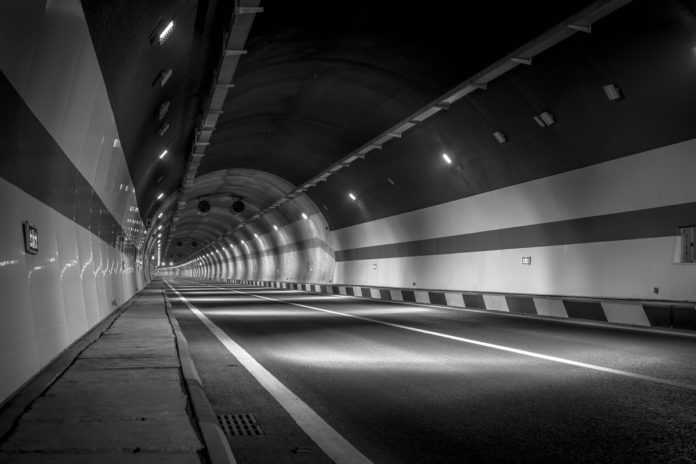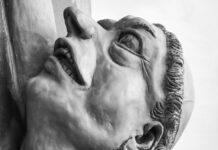Dad’s car had plastic seat covers and no seatbelts. Whenever he turned a corner, he would intentionally accelerate, and Brad and I would slide in tandem from one side of the backseat to the other. Sometimes, after our laughter had subsided, I’d look up and see Dad’s eyes squinting in the rearview mirror.
Many years later, when I became a father and harnessed my newborn twins into their car seats, I resented Dad for allowing us to careen around the back of his car like that. I resented him for a lot of things, for a long time.
Until this moment.
Serenaded by stereo snoring, I check the rearview mirror and catch sight of my children’s heads tilted toward one another, soft whorls of fair hair, long lashes touching flawless cheeks. We had planned to kick off summer break at Disney World; instead, I’ve subjected my family to a two-day car trip to, well, to the opposite of Disney World.
Beneath the latticework of a rusty truss bridge, I decelerate. “He just wanted to make us laugh,” I say.
My wife knows not to ask who “he” is.
Moments later, when I open my window to pay a toll, Aiden wakes up. Up ahead, the mouth of a tunnel appears. In the rearview, I notice Aiden jabbing his elbow against his sister’s arm and Erin pulling herself out of a dream. My daughter tends to awaken grumpy, but when we enter the tunnel, I hear her laughing. “Whoa,” she says. “It’s like that video game.”
The painted lines on either side of the road and the overhead lights meet at a point in the center and appear to shoot out in four directions as we move forward. It feels as if we’re soaring through outer space. A pair of six-year-olds are squealing in the back seat. I grip the steering wheel and surrender to the special effect, allow myself to enjoy it for a little while.
We sail out of the cosmos and into sunlight almost too quickly. Flat-topped high rises and smokestacks and cranes come into view, and the merriment ends. Five minutes later, my GPS informs me that I have reached my destination.
I turn onto the property, pull onto a space next to my brother’s car, take my keys out of the ignition and rest my head against the steering wheel for a moment. As soon as we enter the building, I see Brad seated alone on a sofa, watching TV, and that’s when I break down altogether.
“He’s more comfortable now,” Brad says, when we finally step away from one another. “I convinced him to say yes to all the pain meds. He no longer needs to obsess over side effects or long-term effects.”
There will be no long term for our father.
My brother breaks out his smile when he turns to Gina and the kids. “Look at how big you guys are,” he says. They hug him, albeit formally and politely. Erin asks, “Is Kacey here?”
“Your cousin’s at home with her mom. You’ll see them later at dinner.”
I look around the lobby, more like a living room, with overstuffed seating and flower-filled vases at either end of a coffee table. “It’s nice here,” I say. If not for a strong scent of urine and antiseptic, I would never know there were people dying behind closed doors.
“It’s real nice. We were lucky to get in.” Lucky that someone died so my father could take his place. “The staff here is amazing. Listen… he’s lucid right now but that’ll all change once the drugs really kick in.”
“He’ll be out of it?”
“He’ll barely be conscious. But he’ll be comfortable. And we should keep talking to him, even then, ’cos he’ll be able to hear us.”
“Understood.”
“Ready to see him?”
I can tell my children are getting nervous because they’re not usually this quiet. “You guys ready to visit Grampa?” I say.
They nod and stay adhered to their mother as we follow Brad to a door in the corner. He opens it without knocking. “Dad?” He sticks his head in and blocks our view. “I’ve got some special visitors to see you.”
I don’t recognize the hollow hoarse voice that responds, nor can I make out what’s been said. At first, I figure there’s a soft-spoken doctor talking to Brad; then I walk in and see no one but my emaciated father splayed out beneath the sheets.
Gina hangs back in the doorway so the twins can bury their faces against her and compose themselves, while I step forward. “Dad?” I may be able to force a smile, but I can’t hide the surprise in my voice. How is it possible that this is the same man who towered over me and yelled at me when I flunked seventh-grade science? “How ya feeling, Dad?” The room smells a little like our porch did when a raccoon crawled under it and died.
One of the children sobs behind me. Since my father isn’t wearing his hearing aids, hopefully he doesn’t hear.
“Better… You drove all the way here?” His voice is crackly and barely audible. He used to embarrass Brad and me by talking too loud to the cashiers at McDonald’s, some of whom were our friends.
“Yup. And I brought Gina and the kids too.”
Dad is too weak to seek them out, waits with his bloodshot eyes turned to the ceiling as they approach. His face is the same bluish-gray shade as the tubes coming out of his nose.
“Listen, I think I’m gonna head home,” my brother says, when my family reaches the foot of the bed. His presence has been a good distraction. I kind of wish he wouldn’t go just yet. “See you guys at dinner.” Brad kisses my father’s cheek and whispers something to him, then steps out of the room sideways, even though there’s plenty of space around us.
My children lean in and place their cheeks against his chest and close their eyes to let him know they love him. He’s talking too quietly for me to make out his words, but I can hear Aiden telling him about an award he received on the last day of school and Erin telling him that the clouds looked like pink cotton candy last night at sunset and Gina updating him about work we’ve done on the house.
Then they step away.
“I’ll take them out to the lobby,” Gina says. “We’ll hang out and watch TV for a while. Give you some time alone with your father.”
I sit on the edge of his bed, in part because the stench of death is making me feel light-headed. “You’ve been a good dad,” I say.
“So’ve you.”
“I’m sorry if I haven’t always been the best son.”
He winces. “It’s just something that happens between fathers and sons. No doubt Aiden’ll give you a hard time when he’s older… I think all in all, we made out okay… Don’t you?”
I push tears off my cheeks. “Yeah. I think we made out okay.” It takes me a moment to go on. “It’s not fair, you and Mom…” I can’t finish. Neither will have made it past their sixties.
“Beats the alternative… It’s the natural order of things…” He closes his eyes.“My only regret is that I’ll go before I’ve had a chance to figure out the meaning of life.”
“It’s okay. I figured it out on the way over here.” I place the back of my hand against his forehead. “You taught it to me, Dad. It’s simple…”
A nurse walks in to check his IV. When she leaves, the pain meds are really kicking in. My dad can only continue our conversation in two words. “Tell me.”
“The meaning of life? It’s to make your children laugh.”
He squints, the way he used to when he would look at me in the rearview mirror.
##
“Are we going to a restaurant?” Erin asks. She loves going out to eat.
“Yup. First, we’re stopping at the hotel to drop our things off.”
“Will we be on a high floor?”
Why couldn’t I have at least given my children that? They loved our eighteenth-floor suite at the beach last year. The day before yesterday, I booked us a room in a two-story motel in the suburbs, close to Brad and Karen’s house.
In my hesitation to answer, Gina comes to the rescue. “Our hotel doesn’t have any high floors, but it does have a pool.”
This elicits a couple of cheers from the back.
“Will we go through the tunnel to get there?” Aiden asks.
My GPS is telling me no, there’s a more direct route. But the hell with it; let the device figure out how to reroute. I make a U-turn, check traffic behind me and see my eyes squinting in the rearview.
“Ready to go into outer space?” I say, as I approach the toll.
“Ready!” the children shout in unison.
They are already giggling and I’m already grinning as I accelerate into the mouth of the tunnel.
About the Author

Bari Lynn Hein’s stories are published in The Saturday Evening Post, Adelaide, Verdad, The Ilanot Review, Brilliant Flash Fiction, The Santa Fe Literary Review, Sensitive Skin Magazine, The Fictional Café and elsewhere. Her prose has been awarded finalist placement in many national and international writing competitions, among them The Saturday Evening Post Great American Fiction Contest, OWT Fiction Prize and Jerry Jazz Musician Short Fiction Prize. Her debut novel is on submission. Learn more at barilynnhein.com
















